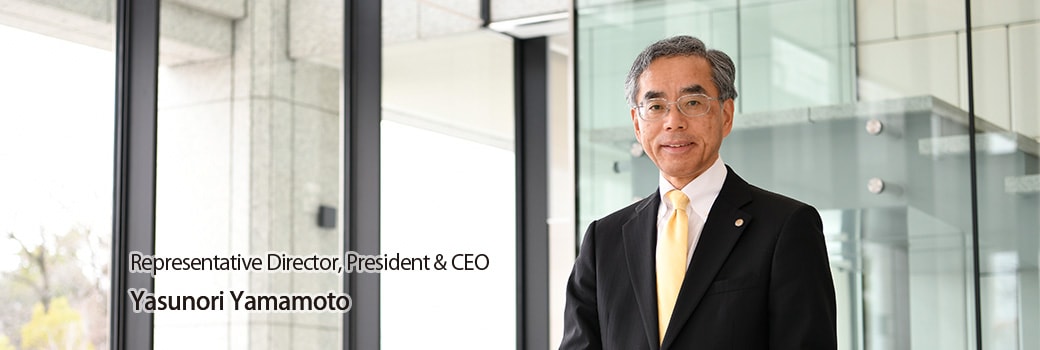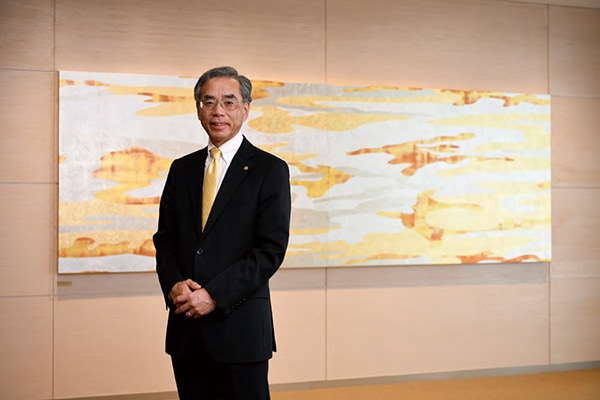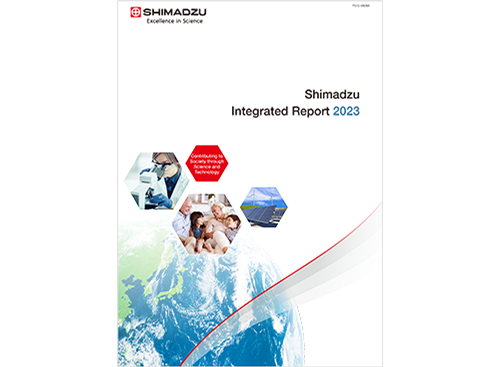
Achieving Sustainable Growth by Contributing to Solving Challenges in Society Based on a Spirit of “Excellence in Science” and “Best for Our Customers”
In March 2025, Shimadzu Corporation will celebrate its 150th anniversary since the company was founded. The reason Shimadzu was able to keep contributing to society during that long 149-year period was our approach of addressing societal challenges and problems that customers want to solve, while consistently taking on new challenges. By continuously challenging ourselves to develop key devices for manufacturing and developing new technologies, we have accumulated a diverse range of technologies. This treasure trove of innovations allows Shimadzu to quickly provide solutions to customer challenges.
In the future as well, the key to the Shimadzu Group achieving sustainable growth and planetary health will be to continue challenging ourselves to solve challenges in society based on a spirit of “Excellence in Science” and to keep striving to provide the “Best for Our Customers.” Customer needs are currently shifting from physical products to data/solutions. Therefore, in the medium-term management plan that started in FY 2023, we specified implementing end-to-end solutions that include pretreatment systems, automation systems, consumables, and control/data analysis software based on a business model of supplying the data that customers truly require. The plan also specifies four areas of focus for Shimadzu Group efforts: healthcare, green transformations (GX), materials, and industry. Accordingly, we have started shifting toward capabilities to better identify and address the true needs and frustrations of customers in those specific areas.
Progress in Achieving First Year Targets of Medium-Term Management Plan and Future Outlook
Despite actively investing in growth during the first year of the medium-term management plan (hereinafter “medium-term plan”), we achieved record results due to favorable exchange rates and other factors. Contributions from India and Europe sufficiently offset the impact of worsening market conditions in China, which was not anticipated when the medium-term plan was prepared. While some growth strategies and management reinforcement measures were successfully implemented as planned, others highlighted areas needing improvement. A particular concern is the Med-Tech business. Unlike typical fields, releasing products and services in clinical fields requires special approvals in each country. Unfortunately, both the development and approval processes are taking longer than expected, so we will accelerate those processes by modifying strategies and bolstering human resources.
For the second year of the medium-term plan, we will implement organizational reforms to a greater extent than before, based on a business model of supplying data that customers truly need. First, given that those reforms should be implemented beginning with sales units, which are the organizations closest to customers, we integrated them into the Sales & Marketing Division in April 2024. The intention is to expand the scope of one-stop services offered by promoting partnerships across divisional and regional boundaries. Next, following the sales reforms, we will also implement manufacturing organizational reforms and prepare for transitioning to a division-based organization, aiming for enhancing global strategies and improving manufacturing efficiency.
In North America, where we have been focusing particular efforts, we will utilize the R&D Centers opened in April 2024 to identify cutting-edge needs of leading global customers. Based on their needs, we will repeat a cycle of creating prototypes and maintaining a dialogue with local customers and build capabilities to solve challenges locally in North America. This will involve targeted investments, including in human resources.
We will also create and develop new businesses in healthcare fields, such as pharmaceuticals, foods, and Med-Tech; in green transformation and materials fields, such as organofluorine compounds (PFAS), batteries, EVs, hydrogen, and ceramics; and in industrial fields, such as semiconductor manufacturing.
Business Portfolios
Currently, the Shimadzu Group portfolio includes businesses in four segments, which are analytical and measuring instruments, medical systems, industrial machinery, and aircraft equipment. Of those segments, the analytical and measuring instruments segment is designated as a key business for achieving global growth through additional investments. The aircraft equipment segment is defined as a business for reorganization, whereas the other two segments—medical systems and industrial machinery—will be strengthened. However, improving profit margins is an urgent challenge for both segments, so measures to increase operating margins will be implemented in the short term.
The medical systems segment is especially important in terms of fulfilling the Shimadzu Group mission of “Contributing to Human Life and Well-Being.” Particularly in the near future, pressures to reduce medical expenses and reforms in physician working practices are expected to reduce the time physicians can spend treating patients. Consequently, we think there will be a global need to discover diseases sooner, before pathogenic onset and worsening of symptoms, and treat them more quickly. The Shimadzu Group already offers solutions that combine medical diagnostic imaging systems with analytical & measuring blood testing instruments for newborn mass screening, performed to investigate the probability of congenital disorders occurring during the neonatal stage or to prevent/diagnose osteoporosis.
Looking ahead, we intend to also offer additional end-to-end solutions for ultra-early detection based on a combination of analytical & measuring instrument and medical system technologies. Meanwhile, we will increase the profit margin of the medical systems segment by using AI image analysis and other diagnostic imaging transformations based on AI/IoT technologies to offer new solutions with higher added-value. Of course, we will also strengthen businesses with recurring revenues, which are important to customers and the Shimadzu Group.
For the industrial machinery segment, turbomolecular pumps, which are designated as a key model, have already achieved the largest market share of the semiconductor manufacturing equipment market, so we will invest additional management resources in order to also develop other non-semiconductor markets. Meanwhile, one issue for the hydraulic equipment business is low operating margins. We will improve profitability by strengthening high value-added products for markets in Europe and the United States and by expanding sales of high value-added products only available from the Shimadzu Group, such as highly silent gear pumps for the expanding EV forklift demand or the new e-Hydro line of combining hydraulic unit and motor products.
Continuing Corporate Cultural Reforms
We will reinforce Group governance by integrating monitoring, risk management, and internal controls based on the basic policy “prioritize compliance above all else.” In our current efforts of building 3 lines of defense (business divisions, administrative departments, and auditing departments) for the overall Group, we have largely completed the foundational aspects. However, when it comes to building solid governance systems for the entire Shimadzu Group, including organizations outside Japan, I think we are still only about half-way there. Given that the Shimadzu Group includes a large number of subsidiaries compared to other companies our size, it is challenging to allocate governance experts to smaller subsidiaries. To address this, we will improve the effectiveness of governance by merging some subsidiaries to create larger, more manageable entities. Two subsidiaries were merged in FY 2023 and similar mergers will also continue in the future. Outside Japan, we will also designate regional headquarters in charge of regional governance, enhance their corporate functions, and establish capabilities for auditing and supervising subsidiaries in their assigned region.
I am confident that if employees work together, we can nip any compliance violations in the bud. We intend to continue team learning workshops on compliance in order to create a culture where employees feel free to say what they want to each other.
Achieving Dreams by Repeatedly Taking on Challenges and Failing
The Shimadzu Group is actively pursuing businesses aimed at achieving planetary health. When each employee and customer has their own ideas and dreams that attract people who sympathize with those ideas and dreams and begin taking them on as new challenges. Of course, not all attempts will be successful, and some will fail. However, I believe that such failures are invaluable treasures for both the company and the individuals involved. Therefore, I often encourage employees to take on more challenges in order to accumulate both successes and failures. In contrast, business processes now involve more people and offer less individual discretion than in the past, which I fear may be leading to smaller dreams. To visualize bigger dreams, I believe we need to expand the range of individual discretion.
People live life moving toward the future. No one lives their life moving toward the past.
When looking toward the future, each person has their own ideas and dreams. I want Shimadzu to become a company that helps achieve such dreams by mutually expressing, sympathizing with, and working to achieve those dreams.
Therefore, I ask stakeholders to continue providing support and understanding as we take on new challenges to achieve our dreams.
Career History
| Apr. 1983 | Joined Shimadzu Corporation | |
| Oct. 2003 | Coordination Manager, Testing Machines Business Unit, Analytical & Measuring Instruments Division |
|
| Jun. 2013 | President, Shimadzu Europa GmbH (Germany) | |
| Jun. 2014 | Corporate Officer | |
| Jun. 2017 | Managing Executive Officer | |
| Jun. 2017 | In charge of Manufacturing, Information System, and CS Management | |
| Jun. 2017 | Deputy Director in charge of Technology Research | |
| Apr. 2020 | In charge of Corporate Strategy Planning and Corporate Communications | |
| Jun. 2020 | Director, Member of the Board | |
| Apr. 2021 |
Senior Managing Executive Officer |
|
| Apr. 2021 | CFO | |
| Apr. 2022 | President and Representative Director (current) | |
| Apr. 2022 | CEO (current) |










